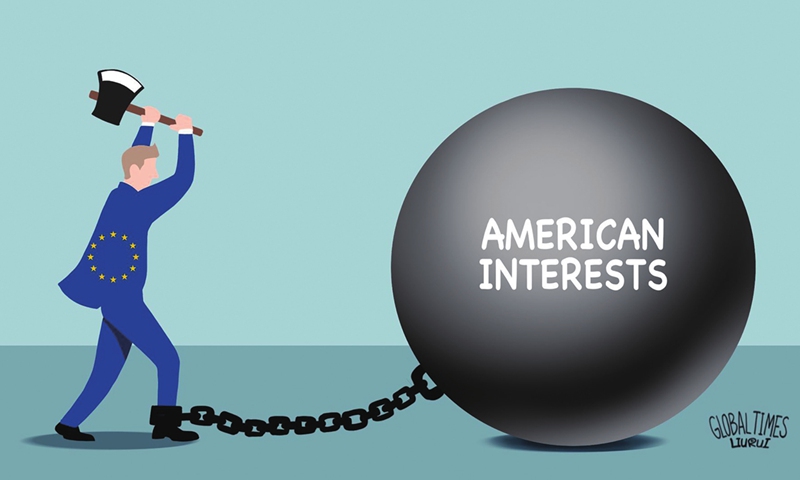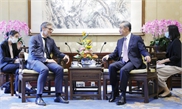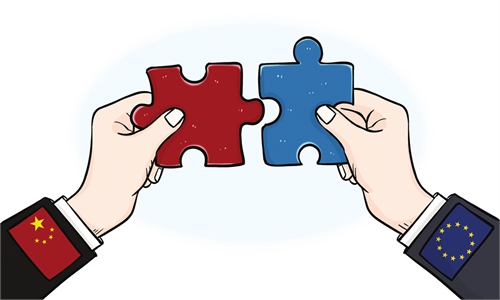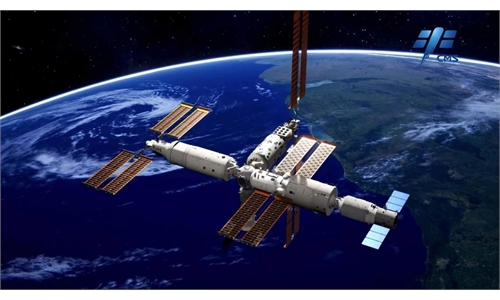EU leaders must listen to Europeans' strong message to their leaders: Stay out of any US war with China

Illustration: Liu Rui/GT
Europeans in 11 countries have sent a clear message to their leaders: We do not want you to join the US in any war with China over the Taiwan question.
The European Council on Foreign Relations conducted a survey, the results of which were released on June 7. In nine countries, the majority of respondents wanted their nation to "remain neutral" in such a conflict. Austrians (80 percent) and Bulgarians (79 percent) were the most adamant about neutrality, while Poles (51 percent) and Danes (50 percent) were the least committed to it. Swedes, at 49 percent, were the only citizens not to offer majority support for neutrality.
Overall, 62 percent of the respondents wanted their country to remain on the sidelines, should the US go to war with China.
The data is stunning, and they make a powerful statement: Europeans from all across the continent are not willing to spend billions of dollars and sacrifice the lives of their men and women in military uniform in order to support America's nonstop war machine. They remember the savage toll in US-led wars, in which multiple European nations participated, in Afghanistan and Iraq earlier this century took on the citizens of those countries. And they know Europe has struggled with how to handle the thousands upon thousands of migrants who have fled war-ravaged areas over the last two decades. In short, Europeans clearly want nothing to do with any US military activity in the South China Sea; they know military excursions alongside America very well can lead to economic disarray, destroyed lands and humanitarian crises.
Now those European presidents, prime ministers and chancellors must decide if they will follow their peoples' preferences. French President Emmanuel Macron has provided one path to do that. Summarized briefly, Macron wants the continent to practice "European sovereignty" and "strategic autonomy." He outlined his plans in April, when he visited China. Later, he told journalists: "The question Europeans need to answer … is it in our interest to accelerate [a crisis] on Taiwan? No. The worse thing would be to think that we Europeans must become followers on this topic and take our cue from the US agenda..."
We know what that agenda is: Continuing to arm Taiwan with billions of dollars worth of sophisticated military weapons and conducting military exercises in the South China Sea. Both moves draw the ire of China; the Americans dismiss such reactions as little more than posturing by Beijing. Make no mistake: The American military-industrial complex must always be fed, and the constant suggestions from Washington that the Chinese mainland will invade Taiwan ensures the military-industrial complex are overweight. And happy. And demanding more.
Meanwhile, as Macron sees it, Europe can - and should - become masters of its own fate by distancing itself from any US lust for war and by seeking strong win-win trade deals with China (and, yes, with the US). The joint declaration issued by France and China following his trip to China illustrated that point. It noted: "France and China reaffirm their desire to pursue the continuous development of their close and solid global strategic partnership, on the basis of mutual respect for their sovereignty, their territorial integrity and their major interests."
Other European leaders have offered similar assessments of how the continent should construct a twenty-first-century relationship with America. Poland's prime minister has advocated Europe adopt a "strategic partnership" with the US, while Hungary's president has said that "we [Europeans] must start from our own interests" in evaluating global politics. Remember that the so-called Global South is also watching, and they are not sold on America's often heavy-handed approach to diplomacy and trade in that part of the world.
Keep in mind that European trade with China is valued at more than two billion Euros per day. Because the US remains determined to maintain tariffs on Chinese products while also denying China access to high-end technologies, the door is open for trade to expand. One news agency has concluded that "Europe's analysts see China as the world's top economy when it comes to purchasing power parity, thanks to decades of explosive growth." Suffice it to say, Europe - a continent with an unsteady economic picture and where growth is likely to be less than two percent this year - risks recession if it turns away from China.
Another European leader - German chancellor Olaf Scholz - can make another potent statement about Europe and China later this month. Meetings involving key members of his administration and their counterparts in China are expected to take place before the EU leaders summit at the end of June. Scholz has already stiff-armed Washington by refusing to support calls for an economic decoupling. "We are against decoupling," Scholz said.
The European public has spoken. While it recognizes that its continent is not unified on maintaining relations with China, it does want its leaders to know that relations with China cannot be tied to supporting US military aggression, especially in the South China Sea.
The author is an associate professor at the Department of Communication and Organizational Leadership at Robert Morris University. opinion@globaltimes.com.cn



